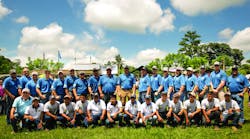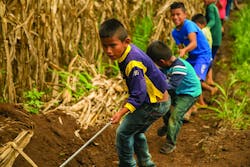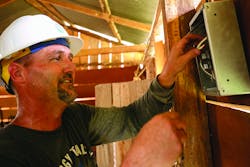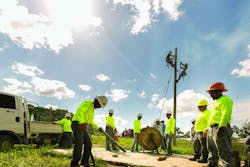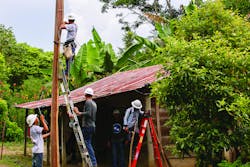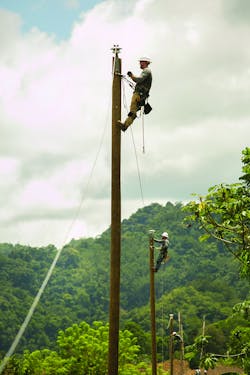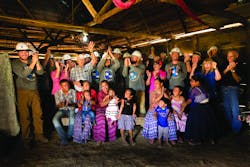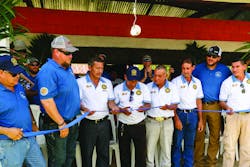Volunteer Linemen Make the World a Brighter Place
Candles burned brightly in two Guatemalan villages, where the residents cooked over open flames. Lightbulbs, however, are now illuminating 100 homes, two elementary schools, two health centers and five churches—thanks to a volunteer workforce of 15 linemen from Oklahoma and Colorado electric cooperatives.
For three weeks, the linemen volunteered their time and talents to provide power to two remote villages near a rainforest in northwestern Guatemala: Pie del Cerro and Tierra Blanca Salinas. The National Association of Rural Electric Cooperatives’ (NRECA) philanthropic arm, NRECA International, coordinated the Energy Trails project.
Arriving in Guatemala
Upon their arrival, the team met a representative from NRECA International at the airport before traveling to Cobán, Guatemala, to spend the night. The next morning, the volunteers completed the journey to the project site.
“When we arrived at the site, we were greeted by several young children,” says Dale Kishbaugh, director of safety and loss control with the Colorado Rural Electric Association. “Everybody was excited to see us arrive.”
The volunteers worked with a local municipal utility, Empresa Rural Municipal de Electricidad (EMRE), which owns and maintains the new infrastructure built by Oklahoma and Colorado co-ops. EMRE, a utility with 26 employees serving 5,000-plus consumers, coordinated the pre-placement of 130 poles prior to volunteers arriving at the project site.
On the first day at the project site, the linemen met with local linemen from EMRE to review the materials available on site and discuss the work that needed to be done during the three-week period.
Next, the linemen traveled on extremely rough, unpaved roads through the national forest to the location where they would be staying—Playa Grande. The crews stayed in a small hotel across the street from the municipality’s operations center, and the utility fed the volunteer linemen breakfast, lunch and dinner every day.
“We bunked three to a room, and some days we had warm water, and other days we did not have it,” Kishbaugh says.
Not only the Colorado linemen, but also the volunteers from the Oklahoma cooperatives stayed in the same hotel, which gave them the opportunity to forge a bond and a strong working relationship.
Working as a Team
During their three weeks in Guatemala, the volunteer linemen worked with the local municipality to complete the project. According to project team leader, Derec Janaway, director of safety and loss control for the Oklahoma Association of Electric Cooperatives, the heat and humidity were the greatest challenges.
“The first couple of days we worked in the cornfields along the rainforest, the humidity was so high it felt like we had very little air,” Janaway says. “I watched the guys pretty hard to make sure everyone was okay.”
The volunteers focused on framing the poles in the air, stringing the primary and secondary wire and installing wiring for lightbulbs, light switches and receptacles in the homes inside the villages.
“EMRE was a huge help for this project,” Kishbaugh says. “They partnered with a local vocational school and recruited help from students to wire the homes. Their linemen also helped where they could.”
Connecting with the Community
By giving of their time, the linemen were able to reap rewards that they will likely cherish for years to come. For example, the children in the villages excitedly waited for the linemen to arrive. They would then watch the crews work and play games with them during their lunch break.
When the lights came on, the children and the entire community were excited.
“The kids were cheering, and you could sense that the people living in the villages would benefit and have a better life with electricity,” Kishbaugh says.
In addition to giving the residents the gift of light, the cooperatives were also able to donate a computer and printer to each school in the two villages. With additional donations made to the Energy Trails project, they were also able to donate two wheelchairs for two children who could not walk. Finally, they gave each home a water filter for each household to benefit from cleaner water for at least two years.
Giving Back
The linemen came from two different states, but they worked as a brotherhood during the volunteer mission, says Janaway. He says he could not have asked for a better team.
“The biggest memory that I will have is building a brotherhood with the linemen on the Energy Trails team,” Janaway says. “We had only met once before the project, but once the project started, we looked and felt like brothers who had worked alongside each other for a long time. The relationships built will last forever.”
As they volunteered their time and talents in the villages, which were about 30 miles from the Mexican border, he says it was all about their hearts.
“It’s what you can give back to people who are truly in need,” Janaway says.
Janaway says the trip to Guatemala was the second time he has volunteered with the Energy Trails project. He joined the Oklahoma’s inaugural trip to Bolivia, and he wanted to return for another opportunity to turn the lights on for a community for the first time.
“Everything was much more beautiful than words could describe,” Janaway says. “The country is full of rich culture.”
For example, he says after arriving in Guatemala City, his team traveled on winding roads around the mountains and past coffee bean plantations and corn fields, which covered the mountain landscape.
From his first day in the country, he discovered that the Guatemalan villagers had a strong work ethic.
“It was eye opening getting to meet the locals and how they lived,” he says. “Everything they did was by hand. The cornfields were planted by hand, harvested, corn loaded and then shucked all by hand.”
Janaway says he will never forget the feeling of being able to change the lives of the Guatemalan villagers.
“Getting to see the villagers’ excitement will last forever in my heart, especially the kids,” Janaway says. “This will help them to build a better life for themselves.”
‘Part of the Cooperative DNA’
Providing electricity to areas with no power is part of the cooperative DNA, says Chris Meyers, general manager of the Oklahoma Association of Electric Cooperatives.
“These projects enable co-ops to get back to our roots,” Meyers says. “Our linemen today have never experienced life without electricity. These projects expose them to the electric cooperative beginnings and allow them to use their trade to give a gift to families that will last for generations to come.”
Sidebar - On a Mission: Linemen From Two States Work as One Team
These cooperatives sent volunteers for the 2018 Energy Trails project in Guatemala:
Oklahoma:
- Oklahoma Electric Cooperative (Norman, Oklahoma)
- CKenergy Electric Cooperative (Binger, Oklahoma)
- Cimarron Electric Cooperative (Kingfisher, Oklahoma)
- Southwest Rural Electric Association (Tipton, Oklahoma)
- Indian Electric Cooperative (Cleveland, Oklahoma)
- Central Electric Cooperative (Stillwater, Oklahoma)
- Southeastern Electric Cooperative (Durant, Oklahoma)
Colorado:
- Colorado Rural Electric Association (Denver, Colorado)
- Holy Cross Energy (Glenwood Springs, Colorado)
- Southeast Colorado Power Association (La Junta, Colorado)
- Poudre Valley Rural Electric Association (Fort Collins, Colorado)
- United Power (Brighton, Colorado)
- Mountain Parks Electric (Granby, Colorado)
Editor’s Note: Visit www.tdworld.com/electric-utility-operations/linemen-light-world-one-village-time to view a photo gallery from the project.
You can also make a tax-deductible donation to support future projects for the Oklahoma Energy Trails Foundation at www.oaec.coop/energy_trails.
